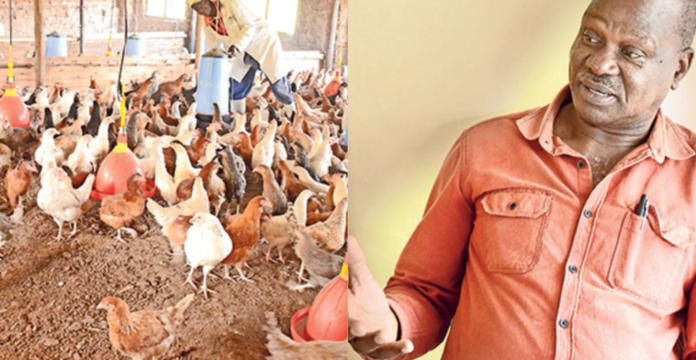Wycliffe Mwangale is a veteran poultry farmer with his own established Chicken farm, BreedTech Chicken Farm.
Having started the business in 2001 with just 40 chickens, Mwangele can testify to the exponential growth he’s seen in his business.
He was intent on turning his hustle into a successful investment.
“The 40 chickens multiplied as we kept on brooding them and soon, I had 400 birds and I have grown the business since then,” says the father of six.
Today, with more than 4,500 kienyeji chickens at his barn, Wycliffe Mwangale is among the most well-connected and trusted suppliers of poultry products in the Western and Nyanza regions.
He sells chickens for slaughter, eggs, and chicks and produces his own poultry feed. He keeps the chicken in a brick wall barn, which would easily be mistaken for a four-bedroom bungalow mansionette.
Mwangale, a former Veterinary officer, produces his own chicken feed by using American Software to mix and balance the ingredients.
READ: Pauline Osoro: My tough journey to building profitable Kienyeji chicken business
Meticulously, his objective is to ensure that his chickens are fed well to optimize production.
“You must get it right lest you end up with unbalanced feeds that would not support your production needs,” he says.
Within his barn, the 50-year-old has divided into sections. Birds are housed according to their phases of development/ reason for which they are kept.
Some of the classifications include; Broilers, Layers 16 weeks, 12 weeks, 9 weeks and 1 week.
Wycliffe Mwangele revealed that he commercialised his company by switching to enhanced Kari Kienyeji chicken. Additionally, he purchased two incubators with a total capacity of 18,000 eggs, 9000 each.
“Poultry business has some risks but with proper management and foresight, all goes well,” he advises.
Mwangele vaccinates his poultry birds against diseases like Newcastle, infectious bursal disease (gumboro) and fowl pox.
Having spent between Sh. 480 and Sh. 550 on upbringing the birds, he sells them at Sh. 700. He sells fertilised eggs at Sh. 30 and chicks at Sh. 110.
Mwangele notes that the business is very demanding and costly. According to him, many people venture into chicken farming but struggle because they fail to follow recommended practices.
This leads to difficulties in achieving their goals. Mwangele states that quality feeds are the key to his business success.
“These birds consume plenty of feeds and take time before reaching the market weight, unlike broilers. This translates into more expenses, which makes people give up,” he says.
As mentioned earlier, Mwangele formulates his own poultry feeds. He also sells them to other farmers.
“We give broilers very high proteins to put on weight so that they can reach the market weight faster,” he says.
“For those laying, we give them feeds with less energy, protein content of 15-16% for their maintenance and because they are producing eggs, we normally give them calcium of about 3.7% because to produce good eggs, the birds need the mineral,” he explained further.
Mwangale makes between Sh. 2,200 to Sh. 2,400 selling a 50kg bag of his self-made poultry feeds. He has employed 17 employees to help him run the farm.
His final piece of advice, Mwangele, suggests that the government and other organizations seeking to empower communities through chicken-rearing projects should provide groups with chicks that are at least two weeks old to reduce mortality rates.
He also stresses the importance of teaching proper record-keeping and feeding practices, which can be costly but essential for success.
“These groups should also be trained on disease management to help sustain the project.”
Some Don’ts in Poultry Agribusiness:
- Don’t overstock your farm with chickens. Keep the number of birds that you can manage efficiently.
- Don’t neglect the vaccination program. Proper vaccination is essential to prevent diseases and minimize losses.
- Don’t keep changing the type of feed you give to your birds. Consistency in feed is necessary for optimal productivity.
- Don’t allow just anyone to enter the poultry unit. Unauthorized entry can spread germs that can cause diseases in the flock.
- Don’t skip the vital stages of growth. A good starting point in poultry farming is with chicks. Take them through the various stages of growth, including vaccination, to ensure healthy growth and maximum productivity.









